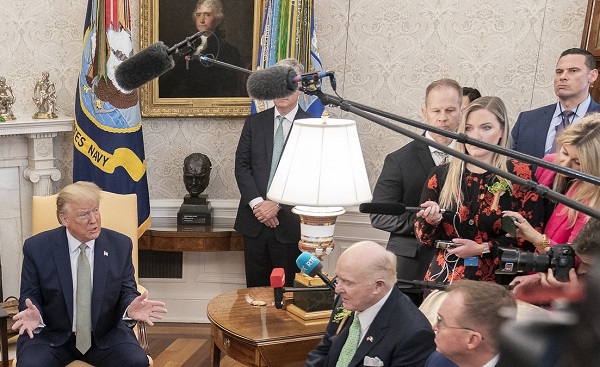
New York, The impact of the coronavirus crisis HAS reverberated across the US, from the economy and politics to religion and sports, as leaders struggled to find solutions to the myriad problems.
Wall Street suffered its worst day since the 1987 Black Monday crash as stocks plummeted nearly 10 per cent on Thursday – a day after President Donald Trump ordered a travel ban on Europeans from 26 countries from entering the country.
While the markets ignored the Federal Reserve Bank’s announcement that it will pump $1.5 trillion short-term loans to banks “to deal with the highly unusual disruptions” caused by the coronavirus outbreak, President Trump’s officials and House Speaker Nancy Pelosi were nearing a deal for an economic rescue package on Thursday night.
Pelosi said that they had settled most of their difference and the House of Representatives was likely to vote on it on Friday. The Senate has cancelled its spring break next week and will stay in session to take it up.
Trump and Republican leaders in Congress have bad relations with Pelosi, having traded personal insults. Therefore, Treasury Secretary Steven Mnuchin has been negotiating with Pelosi and her fellow Democrats who control the House.
The Democrats have used their power in the crisis when Trump has a crisis on his hands to wring several concessions on worker benefits that the President had opposed.
The package is expected to include 14 days of paid medical leave for those who don’t have it now by providing tax credits to small and medium businesses to help pay for them.
Other expected features include extended unemployment benefits, family leave to care for those suffering from COVID-19 and free testing, as well as ensuring protection against improper medical billing.
The Democratic Party front-runner to challenge Trump, former Vice President Joe Biden, accused him of leaving the nation “woefully unprepared for the exact crisis we now face”.
The Trump administration has been criticised for failure to prepare for the crisis between the time the coronavirus was found in China late last year and in February when it began to show up in the US.
The most glaring shortcoming was in developing tests for the disease, which is required as the first step to identify the infected people and quarantine them. The initial batch of tests prepared by the Centers for Disease Control and Prevention (CDC) was found to be faulty.
Although Trump had claimed that tests would be available for all those who need it, only one million test kits were shipped out by last Friday and another four million were expected to be sent out by the end of this week.
As the number of coronavirus cases exceeded 1,200 with 30 deaths, Trump raised the “possibility” that restrictions could be imposed on travel within the country if some places in the country got “too hot”.
Trump was reported to be considering declaring a national state of emergency that would allow him to free up billions of dollars to meet the crisis.
New York Governor Andre Cuomo has imposed a state of emergency and ordered a containment zone around the worst affected area in the New York City suburb of New Rochelle where there has been nearly 150 cases.
The Army National Guard moved into the town on Thursday to help clean the area and distribute food to seniors and needy children.
Both Republicans and Democrats have suspended campaign meetings with the general election less than eight months away.
Biden and his rival for the Democratic presidential nomination, Senator Bernie Sanders, have asked their campaign staff to work from home.
The White House, the Capitol, which houses the Congress, and the UN have stopped allowing visitors.
Coronavirus is taking a toll on the intellectual, cultural, sporting and, even, religious lives of the nation.
Several academic and professional conferences and technology events, including the New York Auto Show, have been bagged
Cuomo banned gatherings of over 500 people, which could lead to curtailment of performances on the city’s famed Broadway theatre district
Across the country, music programmes and theatre performances are being cancelled.
Among entertainment spots closing down are the iconic Disneyland and Walt Disney World.
Several museums, including the Smithsonian, and art galleries have been temporarily closed to visitors.
One of the influential religious sects, the Church of the Jesus Christ of Latter-day Saints, known popularly as Mormon, asked its adherents to cancel all public worship services. Other Christian churches have introduced precautionary measures in their religious services to lessen the risk of contagion during the season of Lent leading up to Easter.
In New Jersey, Orthodox Jewish rabbis have ordered the closure of synagogues and cancellation of religious services.
In a country where sports is like religion, the national basketball, football, baseball and college athletics organisations have suspended or delayed their season.
The states of Maryland and Ohio and some local authorities scattered across the country are shutting schools.
Universities and colleges across the country, including Ivy League institutions like Harvard, Columbia and Princeton, are either extending their spring vacation or going into tele-education mode.
In New Jersey where one person has died of the disease, all local sporting events have been cancelled in suburbs.
School superintendents have sent out forms to families to check if they had the technology and the ability for online classes if the schools had to shut down.
Non-essential staff caring for seniors have been asked to stay home and firefighters with sniffles are being back home.









